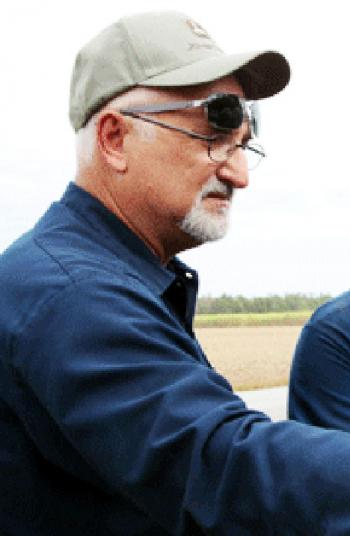
Ted Broussard
St. Mary Parish farmer is a ‘farmer’s farmer’
From The American Sugar Cane League
To suggest that St. Mary Parish sugarcane farmer Ted Broussard enjoys farm management is an understatement.
He is, in fact, driven by a deep desire to continually test his knowledge, his skills and his equipment to be the best possible farmer he can be.
His journey to the cane field is a bit different from most. His family has been farming for only three generations and came into it when one could get into farming with a small investment. In fact, if iceboxes hadn’t become obsolete, he might have been in the ice business.
“My grandfather, Jackson Broussard, was the ice man in New Iberia,” Broussard said. “When he saw that iceboxes were coming to an end, he moved to the country and bought 40 acres and started farming in the early 1950s.”
Though it was relatively easy for the Jackson Broussard family to get into farming, it was a considerable task for the fledgling farming family to stay in business.
“My grandfather died a few years into the farm,” Broussard said. “I never knew him but my Granny, Olampe, she kept Square B Farms going and made sure my daddy and his older brother did what needed to be done in the fields.”
Now, at age 53, Broussard is about to purchase the assets of Square B Farms and bring it under the management of his Ted Broussard Farms banner. Next year, with the 1,900 acre acquisition of the Broussard “family farm,” Broussard will be responsible for managing more than 5,700 acres of prime Teche Valley land.
Broussard is not worried that he might have bitten off more than he can chew. He has a plan.
“One thing I want to do is make sure that there’s enough land for each of my partners if they want to go off on their own or stick together after I’m out of the picture,” Broussard said. “There wasn’t enough land at the Square B for me and I saw the writing on the wall and I left New Iberia to come out here.”
“Here” is the old Lacy and Campdown plantations nestled along Verdunville Road and in between the east bank of Bayou Teche and the Atchafalaya Basin levee at Charenton.
His partners are his 38-year-old nephew, John, and Quaid, his 25-year-old son. They’re capable farmers but a 5,700-acre farm sounds like, well, a lot.
“We push the limits, that’s for sure,” Broussard said. “In order for me to be maxed out each combine have to push 50,000 tons. That’s not the norm, but I don’t really know what the norm is. If I had to say, it’s probably in the low 40s. But we keep a combine three seasons, and then we trade them in so we’re not spending a day fixing a broken machine. It’s just a different farming philosophy — one’s not better than the other — it’s just different.”
Effectively cultivating a 5,700-acre farm will require efficiency, but that’s no problem for Broussard — he’s all about building efficiencies upon efficiencies.
His combines are equipped with Louviere kickers, a combine custom add-on that maximizes tonnage, plus his fields have all been laser leveled.
“I came up with the Young Farmers program through Farm Bureau and I’ve met farmers from all over the state,” Broussard said. “I saw the efficiencies from my friends in north Louisiana and the Delta on their big tracts of land. Everything was just precision. I thought if our fields were like that we could be so much more productive.”
Broussard and his family members at the Square B began the process of sloping their fields for maximum efficiency more than 23 years ago. When he left Square B to start out on his own, he was the first to laser level in St. Mary Parish.
“Laser leveling brings you into another level,” Broussard said. “You get done so much more in a day. There are fewer drains, less erosion, less ditch digging. When I said I traded my combines every three years, to do that I need to stay around the 40 ton level. You have to have laser leveled fields to do that. If you don’t have it, I don’t care how good a farmer you are, you just can’t do it.”
He’s also in the process of converting his six-foot cane rows to eight-foot double drill rows to increase productivity and efficiency.
“Our preliminary tests have confirmed a productivity increase,” Broussard said. “We’re not sure how big it will consistently be but it will be significant.”
In addition to being an effective farmer Broussard claims he’s a “rich” farmer. He’s not talking about how much money he has in the bank — he talking about the things that really count — family, experience, his ability to appreciate his life and the challenges that come with being a son, brother, husband, father, mentor and Louisiana sugarcane farmer. He credits his success to the support of his family. Walteen, his wife, is one of his advisors when he has to make big decisions. His daughter Jena is another source of inspiration along with his farming son, Quaid.
“They tell me not to tell everyone that I’m a rich farmer,” Broussard said. “But I am. Farming has been good to me but it’s also given me a life that I wouldn’t trade for anything in the world.”
- Log in to post comments
